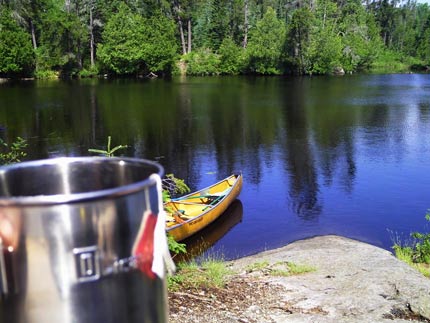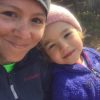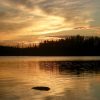Boundary Waters Canoe Area Wilderness: Modified Kawisihiwi Lake/Lady Loop
I found this route referenced by different names in different guides. One guide called it the Kawishiwi Lake Loop and the other referred to it as the Lady Loop. My trip was with a local group called Central Indiana Wilderness Club (CIWC), eight adults from mid 40s to late 60s with a common purpose: love the outdoors. For some this was their first trip, for one person it was her 14th trip. We traveled for six days.
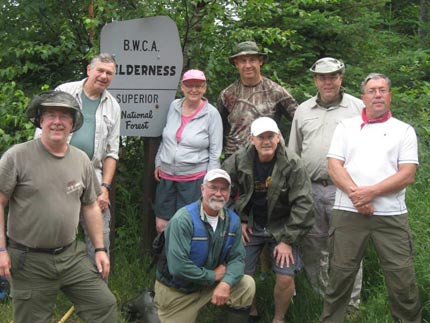
We chose Sawbill Outfitters to supply our canoes and shuttle us. Everything else we supplied ourselves. My personal pack was a new style of military XL ruck sack. You can tell I was not infantry when I was in uniform, I over packed. I figured if I could lift the pack, I could portage it. My pack was about 60 lbs and when it was wet probably 70 lbs. It was wet a lot. In mid July, I figured the weather would be dry and bugs would be bearable. I was wrong on both.
Route: Kawishiwi Lake, Square Lake, Kawaschong Lake, Townline Lake, Lake Polly, Koma Lake, Malberg Lake, Phoebe River, Hazel Lake, Knight Lake, Phoebe Lake, Grace Lake, Beth Lake, Alton Lake and Sawbill Lake
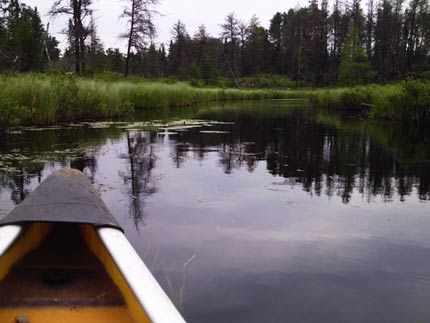
Day One: Our group met up in Indianapolis in the afternoon with the plan to drive straight through to the Outfitter. Long drive, very long drive. At one point we stopped at a rest stop to sleep for a few hours. All the drivers were too tired to go on. Some of us had worked a full day before we hit the road. I slept in my seat in the van, others slept on picnic tables and park benches. When we arrived at Sawbill Lake, we spent the first night camping in their campground so we could have an early start the next day.
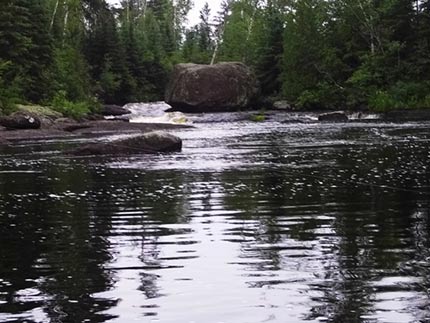
Day Two: First day on the water, the morning looked like it was going to rain and it did. We entered at entry point 37—Kawishiwi Lake. Finally on the water, I couldn’t believe I was here. All the challenges to make this trip happen finally paid off.
Our route took us through the 2011 Pagami Creek fire area. New growth is back in the area but you can still tell there was a fire. On one of our longer portages of the day we ran into a couple of portage angles. Two young women traveling the opposite direction carried a couple of our packs when they headed back to pick up their remaining gear. Didn’t learn their names, but I will think of them as a couple of angles.
It rained most of the day and some of the portages the mosquitoes were so thick we either had to portage in our bug nets or end up with a mouth full of bugs. Our first day ended on Koma Lake. The campsite we picked was not big enough for our group. The eight of us used six tents and two hammocks. Half of our group picked another site on a small island.
Day Three and Four: The next morning the fishing crowd decided to check out Malberg Lake. My canoeing partner became Tim. He was an avid backpacker with some experience in a canoe. Tim and I decided to get out of our campsite and explore north to Malberg Lake. We checked out a couple campsites—one was taken by a couple that passed us the day before. The other was a beautiful spot, but would have been too small for our group. We had lunch there. I had humus with pita chips and a bottle of filtered lake water. At that moment I felt I was living the “good life”.
When we headed back to our campsite on Koma, the group decided to break camp and head to Polly Lake. Glad we did, found a wonderful site. Great view and room for all of us. The guys sleeping in hammocks found trees on the water to set up on. They had a wonderful morning wake up view. Decided to spend two days on Polly. The only negative on this site, as soon as it got dark the mosquitoes swarmed. It was like a cloud. We all headed in for the evening.
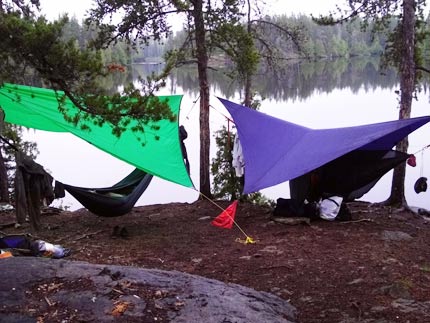
Day Five: Hoped to catch the sunrise but slept in. It rained during the night and everything was calm. The sky was clear and the morning water was like glass. Had a cup of tea overlooking the water; it was the most relaxed I’ve felt in years. One of the Bills asked me what I was thinking. I realized I wasn’t thinking at all. Not a care or worry was in my mind. I was meditating without being in the lotus position.
The day’s plan was to paddle to Phoebe Lake. Most of the route was upstream on the Phobe River. No problem, there was little current and the portages had some beautiful small waterfalls. The only incident occurred when one canoe (our most seasoned team) got hung up on some rocks at a put-in point and overturned. I went in the water to help. A few bumps and bruises but everything dried out that night. Small beaver damn and slippery rocks made for a tricky put in location.
We reached Phoebe early enough to check out our camp site options. We settled on a small island that didn’t seem like it was used much. Great spot, few mosquitoes, just had to deal with the large ant colonies on the island. Don’t know how they got here but they have been there a while. They didn’t bother us, we did our thing and they did theirs.
As the sun set I watched a large bald eagle check out a canoe from our group that was fishing. They were catching very small fish and tossing them back. The eagle decided that was a waste of good fish and snagged a couple from the water when they were tossed back in. Wish we could have stayed on this camp site a couple of days. The only complaint was not having a good tree to hang our bear bag. Instead we went to plan B and found a spot in the woods, away from our campsite, to put the bags under a tree.
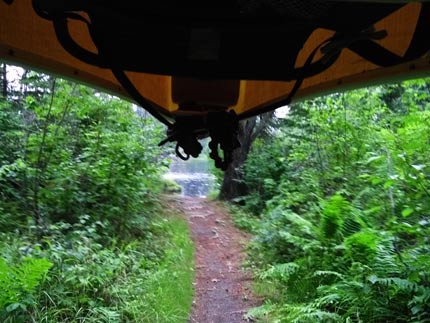
Day Six: We had heavy rains during the night. Had to pack up the tents and other gear wet. The morning discussion mostly focused on the portages we faced that day: a 285 rod portage from Grace Lake to Beth Lake and another 140 rod portage from Beth Lake to Alton Lake. The plan was to find a camp site on Alton and have an easy last day.
The 285-rod portage tested all of us. We portaged half way, lay down our gear and go back for the second load. I drank lots of water during and after that portage and needed to pump more during our lunch break. We stopped on Beth Lake for lunch and discussed whether we should go with the original plan and stop in Alton Lake, or push on and camp at the Outfitter and get an early start to get home. The suggestion even came up to push to the end, take a shower and find a hotel somewhere near Duluth.
Just as we were about to push off it began to rain—one of the hardest storms I have ever been in. My rain gear was in my pack. I stood behind a tree with my head down into the wind. My Tilley hat did a great job in the rain but I was soaked. During the middle of the storm we decided to push to the end and find a hotel. Had about 3” of rain in our canoes after the 30 minute storm. Glad it didn’t last much longer.
Worried about another storm rolling in we pushed hard across Beth Lake to our last long portage, 140 rods. As we were pulling into the take out, a family on a day trip was sitting there. Their canoes were on the Alton side of the portage. We must have looked like group of drowned rats. The adults each grabbed a pack and carried them over to Alton. Of course they didn’t take mine, it was the heaviest pack.
Alton was a large open water lake with lots of camp sites, but from what we could tell most were filled. Just before we reached the last portage our canoe hit an underwater rock and we were stuck. I couldn’t believe that we were going for a swim so close to the end. Luckily we freed ourselves and went on to the take out point. The portage to Sawbill Lake was a short 25 rod trip. We were through the portage and at the take out point in no time.
Hot shower and on the road home. We tossed all our soaked gear in the van and we were on our way. We stopped in a small town north of Duluth to eat. Checked our electronics and noticed we missed a massive storm that night in the BWCA. That was good news, then some bad news. All the hotels in the area were booked for a convention in Duluth. We eventually found a small motel in central Wisconsin around 1 a.m. Have to admit, the bed felt good—all 7 hours of sleep.
Final thoughts: During the toughest portage I thought of work and said, this is better than sitting in front of a computer screen. I plan to go back soon, hopefully next year. My last trip to the BWCAW I took my DSLR and was afraid I would damage it and never took it out. This time I had an inexpensive ($50) water proof digital camera. Didn’t have a worry about keeping it in my pfd and took lots. By the way, did I mention I over packed… I’ll definitely rethink that next time.
